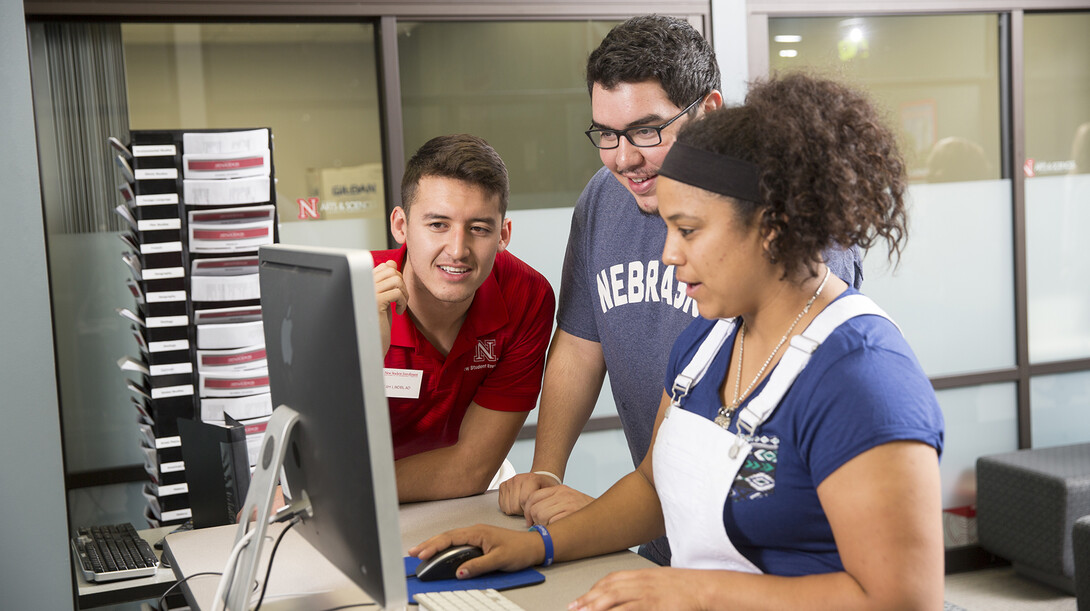
Business majors go into business. Engineering majors become engineers. But what about an English or history major?
To someone who may believe the age-old myth that liberal arts degrees are less valuable than others, the job opportunities predictably seem limited. But a new movement is afoot in the University of Nebraska-Lincoln’s College of Arts and Sciences to ensure students know their career options are, in reality, limitless.
In the past year,the arts and sciences advising center refocused to include a career-planning slant to better prepare students for life beyond college. Meanwhile, departments across the college are incorporating more career planning components into undergraduate advising, curriculum and extracurricular education.
Celeste Spier, career advising coordinator for the college, said students now go into advising sessions with far more than choosing a major and planning their class schedules on their agendas.
“In an academic advising appointment, we are adding in questions to the student about what they want to do with their degree,” Spier said. “We’re spending (time) with students to advise them on how to take those next steps in their career development.”
Students are encouraged, based on their majors and their interests, to seek out experiences that will compound the skills and lessons they’re learning in the classroom, with the expected result being an attractive resume for potential employers.
“One of our taglines is ‘Academics plus experience equals opportunity,’ ” said Christina Fielder, director of advising. “We’re focused on five things: research, internships, education abroad, service, leadership and involvement. All five are readily available here for students and all will parlay into hands-on experience for careers that students are interested in.”
The career-planning focus began when Fielder moved to the advising center from UNL Career Services, the office was restructured and she became director of advising. Renamed the Academic and Career Advising Center, the office was tasked with planning career-advising components to the student experience.
Spier began by talking with faculty about upcoming career fairs and how to use the university’s Career Services office.
The idea was also taking hold in the college, with faculty in several departments thinking about how to incorporate career planning. Ann Tschetter, professor of practice in the Department of History who is also the department’s academic advisor, added career skills to History 250: Historian’s Craft, a required methods course, this fall. Roughly two weeks of the course were devoted to investigating career options.
Students were asked to identify three potential careers, other than teaching, that history majors could achieve. Tschetter also required students to assemble a portfolio and to identify five useful job skills they had learned. Students also were required to attend UNL’s fall career fair.
Kelly Payne, the undergraduate advisor in the Department of English, created an entire course devoted to career development for the department’s majors.
Payne describes English 300: Professional Practices for English Majors as a substantive course on professional development. It’s the result of efforts over the past three years to incorporate such elements into English curricula.
“It gives them the vocabulary to talk about the skills they’ve developed,” she said.
The class includes discussions of how English graduates can apply their degrees in the workplace, interview skills, resume writing, job shadowing and class visits from alumni and professors who discuss a wide range of careers.
The department has also developed more than a half-dozen credit-bearing internships with publishing companies and literary agents.
Tschetter said UNL was on the forefront of incorporating career planning into the humanities. She is involved in the American Historical Association’s “tuning” project, which establishes norms for history coursework at two- and four-year institutions across the country. She made a query on the AHA’s blog, looking for other history departments that might be incorporating this into their curriculum. She found only one example from a college of education that was assisting students who want to become history teachers.
Payne said she had difficulty finding resources as she developed the course. She couldn’t pattern it after similar courses at other universities. She looked for textbooks at the Modern Language Association’s book fair, but didn’t find anything that worked.
“I didn’t find any comparable courses at peer universities,” she said. “The texts I wish were available don’t really exist.”
Spier and Fielder said the advising center is following its own path to boost career planning in the college. Most important, though, is helping students gain entry into a career that coincides with their passion.
“From our standpoint, it’s really great to be a liberal arts major,” Fielder said. “You benefit from making that choice because you’re preparing yourself as somebody who can go into so many different areas.”







